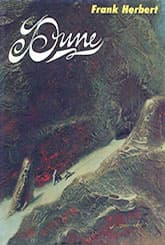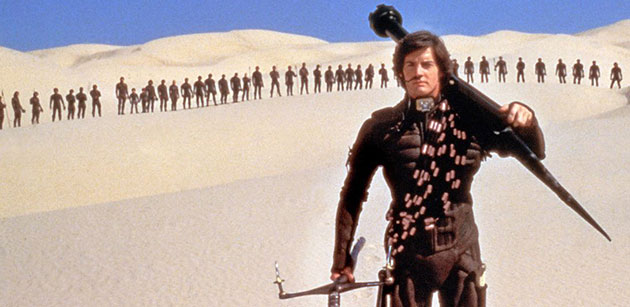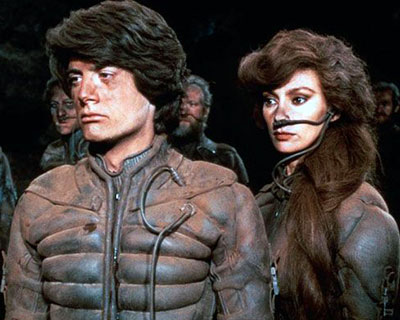Dune
Critique • Quotes • At the movies
 First edition
First editionAlso known as
Dune Chronicles, Book 1
First publication
1965, United States
Literature form
Novel
Genres
Science fiction, fantasy
Writing language
English
Author's country
United States
Length
Approx. 188,000 words

Kyle MacLachlan, as Paul Atreides, leads the Fremen rebellion in the 1984 movie of Dune.
The shifting sands of Arrakis
Dune (1984): Film, 137 minutes; director David Lynch; writer Lynch; featuring Kyle MacLachlan, Francesca Annis, Jürgen Prochnow, José Ferrer, Kenneth McMillan, Sean Young, Sting, Patrick Stewart, Linda Hunt, Brad Dourif, Richard Jordan, Freddie Jones, Max Von Sydow, Dean Stockwell, Siân Phillips, Jack Nance, Virginia Madsen
It's difficult enough for filmmakers to meet the expectations of readers of a popular book, let alone an entire series of beloved epics like Frank Herbert's Dune novels. George Lucas was wise to create Star Wars from scratch, not beholden to the vision of any one author and that author's fanatical followers.
Now, on first glance, Dune might seem a natural for adaptation to the big screen. A futuristic Lawrence of Arabia with all those vast scenes of men and animals fighting across the beautiful desert sands. But also in the vein of the wildly successful Star Wars, with space travel, aliens, bizarre new weapons and strange monsters, plus dollops of New Agey mysticism. In fact, some claim the novel Dune as the uncredited inspiration for the spectacular scifi series.
But further consideration of the novel raises the problem for filmmakers that Herbert's writing is largely internal monologues, skipping from mind to mind in any particularly scene, much of it philosophical or pseudo-philosophical. A lot of pontificating. This makes for engrossingly cerebral storytelling, that is hard to depict in a visual medium. Film and video are better at depicting outward behaviour, at best implying the characters' inner lives.
Yet many attempts have been made to bring Herbert's stories to big and small screens and most have failed, several before finally—nearly two decades after the first Dune novel became a sensation—a passable version appeared. And disappointed nearly everyone.
An interesting miss
Dune author Frank Herbert himself was one of the few to appreciate the 1984 film adaptation—namely, because it was relatively faithful to its source.
But when it came out, the film disappointed two large audience groups: the general public who were expecting a scifi epic thriller like Star Wars and readers who anticipated seeing the breadth and depth of their favourite book laid out on screen.
A much smaller group that also felt let down was David Lynch fans. Lynch, who both wrote and directed the movie, would become known as the eccentric, surrealistic and often perplexing filmmaker who would create such critical favourites as Blue Velvet, Mulholland Drive and Twin Peaks. But at this time his only credits were the bizarre underground classic Eraserhead and the commercially successful The Elephant Man. Dune, however, turned out to neither creatively visionary nor crowd-pleasingly dramatic, but a little of both. Which satisfied hardly anyone. Not even Lynch who complained of compromises, massive cuts and a voice-over narration forced on the film by the studio.
Over time, though, the 1984 Dune has developed a bit of a cult following. It's not that bad really. It's the kind of film that, despite its obvious flaws, you might call "interesting".
Trailer portrays the 1984 adaptation of Dune as a darker Star Wars-style space opera.
You have to overlook its misspent big-budget production, with amazing, beautifully lit, underused sets and with clunky special effects that would have been sensational fifteen years earlier and would better fit into the steam-punk sensibility of fifteen years later.
You have to overlook its erratic continuity, its odd jump cuts and out-of-place fancy wipes to new scenes, probably due to the forced editing. These led many viewers, who obviously had never read the books, to find the film's storyline incomprehensible.
And you have to overlook the waste of an illustrious all-star supporting cast (just look at that list of actors!), most of whom appear a minute or two each.
Overlook all that—if you can—and you may find it's a marvel how much of the essential novel's plot points, and the novel's feel, are captured. And entertainingly.
Kyle MacLachlan, who would go on to perform in several more notable Lynch projects, is a nearly ideal Paul Atreides, starting as the sheltered young aristocrat with witch training through his Bene Gesserit mother and becoming the harder-edged, more mature Muad'Dib, leading the Fremen into battle atop the giant sandworms of Arrakis. (Though his hair remains incredibly well coiffed throughout.) Surprisingly, it's the American actor's first movie role.
Former British child actor Francesca Annis is also impressive in her growth as Paul's mother, Lady Jessica, though like most veteran actors in Dune she has too little screen time to really develop a complete character.
One Lynch innovation though gets too much and too gross attention. Longtime American character actor Kenneth McMillan upgrades (downgrades?) his usual personification of nasty characters into a bulbous, floating Baron Harkonnen with seeping pustules on his face and a sadistic thirst for homosexual blood. He is meant to be one of the main villains of the piece but Lynch turns him into a truly disgusting cartoon figure.
Paradoxically, the one member of the cast who is not primarily an actor makes the best of his short screen time. The musician Sting shows he has real screen presence as the baron's murderous nephew, Feyd-Rautha.
The characters and the storyline get more time to develop in the various cuts of the film that have been released since 1984 including some of the previously trimmed footage. The same critiques and plaudits have been levelled at the new releases though.
A look at later attempts to adapt Dune is to be posted soon.
— Eric


